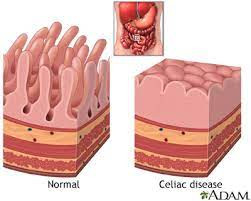Definisi
Penyakit celiac atau celiac disease adalah kelainan pencernaan yang merusak usus halus. Penyakit ini merupakan penyakit autoimun, yaitu kondisi dimana sel kekebalan tubuh menyerang sel tubuh sendiri yang sehat. Penyakit celiac dipicu oleh konsumsi makanan yang mengandung gluten.
Penyakit ini bisa menyebabkan gangguan pencernaan dalam jangka panjang dan membuat tubuh sulit mendapat nutrisi yang dibutuhkan, karena ada banyak makanan yang menjadi pantangan bagi penderitanya. Perlu diperhatikan bahwa penyakit celiac berbeda dengan sensitivitas terhadap gluten atau intoleransi gandum. Pada sensitivitas terhadap gluten, walaupun gejalanya memang mirip dengan penyakit celiac seperti nyeri perut dan kelelahan, tidak terdapat kerusakan pada usus halus.
Penyakit celiac juga berbeda dengan alergi gandum. Kondisi alergi tidak akan menyebabkan kerusakan jangka panjang pada usus halus. Pada alergi gandum bisa timbul gejala seperti gatal pada mata atau sesak nafas, berbeda dari penyakit celiac.
Banyak penderita penyakit celiac yang belum terdiagnosa. Di Amerika Serikat sendiri, diperkirakan ada 2 juta orang yang menderita penyakit celiac. Sementara itu, diperkirakan sekitar 1% penduduk dunia menderita penyakit celiac.
Penyebab
Penyakit celiac dicetuskan oleh makanan yang mengandung gluten. Gluten adalah suatu protein yang ditemukan secara alami pada gandum, biji barley, gandum hitam, dan sering juga ditemukan pada makanan seperti roti, pasta, dan kue. Produk lain yang mengandung gluten adalah makanan kemasan, lip balm, lipstick, pasta gigi, vitamin, suplemen nutrisi, dan obat-obatan (jarang).
Pada penderita penyakit celiac, konsumsi gluten akan memicu respon kekebalan tubuh di dalam saluran cerna. Seiring berjalannya waktu, reaksi yang timbul akan merusak lapisan usus halus, dan membuat usus halus sulit menyerap beberapa zat gizi tertentu. Lapisan usus halus yang harusnya berperan untuk menyerap vitamin dan mineral dari makanan yang dimakan menjadi rusak. Hal ini membuat tubuh sulit mendapat nutrisi yang diperlukan untuk berfungsi dengan baik.
Faktor Risiko
Masih belum diketahui dengan pasti penyebab dari munculnya penyakit celiac. Diduga gen seseorang berkombinasi dengan konsumsi makanan gluten sehingga memicu kemunculan penyakit. Faktor-faktor seperti kehamilan atau persalinan, infeksi virus, stres emosional berat, dan prosedur operasi terkadang bisa membuat penyakit celiac menjadi aktif.
Penyakit celiac umum ditemukan pada orang-orang yang:
- Memiliki riwayat keluarga dengan penyakit celiac.
- Memiliki penyakit autoimun seperti:
- Diabetes tipe 1, terjadi karena pankreas tidak menghasilkan insulin sama sekali atau hanya sedikit memproduksi insulin.
- Rheumatoid arthritis, penyakit peradangan kronis yang memengaruhi banyak sendi tubuh.
- Gangguan organ hati atau kelenjar tiroid.
- Penyakit Addison, timbul karena kelenjar adrenal di tubuh tidak memproduksi hormon yang cukup.
- Sindrom Sjögren, sel imun tubuh menyerang sel tubuh sehat yang menghasilkan air liur dan air mata, dicirikan dengan mata dan mulut yang kering.
- Defisiensi IgA selektif, sebuah kondisi dimana tubuh memproduksi IgA dalam jumlah yang sedikit atau tidak ada sama sekali. IgA merupakan suatu antibodi untuk melawan infeksi.
- Menderita penyakit genetik seperti sindrom Down, sindrom Turner, atau sindrom Williams.
Penyakit celiac menyerang anak-anak dan orang dewasa pada seluruh bagian dunia. Di Amerika Serikat, penyakit ini lebih sering ditemukan pada orang Amerika kulit putih dibandingkan kelompok ras atau etnis lain. Selain itu, penyakit celiac lebih sering terdiagnosis pada wanita daripada pria.
Gejala
Gejala penyakit celiac sangat bervariasi. Seseorang dapat memiliki banyak gejala yang hilang timbul. Penderita penyakit celiac dapat memiliki masalah pencernaan atau gejala lainnya. Gejala pencernaan lebih umum ditemukan pada anak-anak dibandingkan dengan orang dewasa. Gejala pencernaan pada penyakit celiac meliputi:
- Kembung dan banyak gas dalam saluran cerna
- Diare kronis (jangka panjang)
- Konstipasi
- Intoleransi laktosa akibat kerusakan usus halus
- Feses yang lunak, berminyak, besar, dan berbau busuk
- Mual atau muntah
- Nyeri pada perut
Pada anak-anak dengan penyakit celiac, ketidakmampuan menyerap nutrisi pada saat masa pertumbuhan dapat mengakibatkan:
- Kerusakan enamel gigi yang permanen
- Pubertas terlambat
- Gagal tumbuh, membuat anak memiliki berat badan yang kurang atau kenaikan berat badan yang kurang dari seharusnya bila dibandingkan dengan anak seusianya
- Pertumbuhan yang lambat dan perawakan yang pendek
- Penurunan berat badan
- Mood yang tidak stabil, mudah kesal, tidak sabar
Beberapa orang dengan penyakit celiac mengalami gejala yang berasal dari bagian tubuh lain, yaitu:
- Eksim (dermatitis herpetiformis), yaitu ruam kulit yang gatal dan tampak seperti lepuhan yang muncul pada siku, lutut, bokong, punggung, atau kulit kepala.
- Kelelahan
- Nyeri sendi atau tulang
- Masalah kesehatan mental seperti depresi atau cemas
- Gejala sistem saraf seperti:
- Nyeri kepala
- Gangguan keseimbangan
- Kejang
- Gangguan saraf tepi
- Masalah reproduksi pada wanita yang meliputi kurang subur (pada pria maupun wanita), terlambat menstruasi, jarang menstruasi, keguguran berulang
- Gejala yang melibatkan mulut, seperti sariawan, mulut kering, atau lidah yang merah, lembut, dan mengkilap
Gejala biasanya akan membaik dan dapat menghilang setelah seseorang mengadopsi diet bebas gluten. Gejala dapat timbul kembali ketika mengonsumsi sedikit gluten.
Diagnosa
Pertama-tama, dokter akan mewawancarai Anda secara lengkap mengenai keluhan dan gejala yang Anda rasakan, serta riwayat penyakit Anda dan keluarga. Dokter kemudian akan melakukan pemeriksaan fisik pada perut dan seluruh tubuh, melihat bila terdapat tanda penurunan berat badan atau masalah tumbuh kembang pada anak.
Umumnya dokter tidak akan merekomendasikan Anda untuk memulai diet bebas gluten sebelum diagnosis penyakit celiac ditunjang dengan pemeriksaan tambahan. Dokter bisa melakukan pemeriksaan tambahan di bawah bila diperlukan dan peralatan di fasilitas kesehatan memadai, seperti:
- Pemeriksaan antibodi
- Pemeriksaan darah lengkap
- Biopsi atau pengambilan sampel jaringan usus halus dengan endoskopi
- Biopsi kulit bila ada gejala ruam kulit
- Tes genetik
Tata Laksana
Dokter akan menyarankan Anda untuk melakukan diet bebas gluten. Banyak yang mengalami perbaikan gejala dalam beberapa hari sampai beberapa minggu setelah memulai diet. Dokter akan menjelaskan mengenai diet bebas gluten dan mungkin merujuk Anda ke ahli gizi. Ahli gizi akan menjelaskan bagaimana cara menghindari makanan yang mengandung gluten serta merekomendasikan makanan pengganti. Anda juga akan dibantu untuk:
- Mengecek label produk makanan yang mengandung gluten
- Menentukan menu makanan sehari-hari
- Memilih makanan dan minuman yang sehat
Selain diet bebas gluten, dokter juga akan menyarankan untuk menghindari semua sumber gluten, termasuk yang ada pada suplemen herbal, suplemen nutrisi, obat-obatan, vitamin, dan mineral. Obat-obatan jarang mengandung gluten, atau hanya memiliki gluten dalam jumlah yang sangat kecil dan tidak akan menyebabkan gejala.
Beberapa produk dapat menjadi sumber gluten yang tersembunyi. Anda atau anak dapat terpapar gluten ketika menggunakannya di sekitar mulut, atau memasukkannya ke mulut secara tidak sengaja. Produk tersebut meliputi:
- Lilin mainan anak
- Kosmetik
- Lipstick, lip gloss, lip balm
- Produk kulit dan rambut
- Pasta gigi dan pencuci mulut
Komplikasi
Penderita penyakit celiac yang tidak memiliki gejala tetap dapat mengalami komplikasi seiring berjalannya waktu jika penyakitnya tidak diterapi. Komplikasi jangka panjang dari penyakit celiac meliputi:
- Osteoporosis yang lebih cepat atau penurunan densitas tulang yang disebut dengan osteomalasia
- Anemia atau kekurangan sel darah merah
- Malnutrisi, sebuah kondisi dimana seseorang tidak mendapatkan cukup vitamin, mineral, dan nutrisi lain yang dibutuhkan untuk menjaga kesehatan tubuh
- Gangguan sistem saraf
- Masalah terkait dengan sistem reproduksi
Komplikasi dari penyakit celiac yang jarang ditemukan namun bisa terjadi meliputi:
- Adenokarsinoma, suatu jenis kanker usus halus
- Kerusakan hati, dapat menyebabkan sirosis atau gagal hati
- Limfoma non-Hodgkin
Pada kasus yang jarang, dapat terjadi masalah penyerapan nutrisi yang berkepanjangan meskipun sudah menerapkan diet bebas gluten yang ketat. Hal ini disebut dengan penyakit celiac refrakter, dimana usus halus sudah mengalami kerusakan berat dan tidak dapat mengalami penyembuhan. Anda mungkin akan membutuhkan nutrisi melalui infus dan terapi khusus.
Pencegahan
Tidak ada cara yang saat ini diketahui untuk mencegah penyakit celiac. Namun, Anda bisa memeriksakan diri lebih dini bila Anda mengetahui ada anggota keluarga yang didiagnosa dengan penyakit celiac.
Kapan Harus ke Dokter?
Anda sebaiknya berkonsultasi ke dokter jika Anda atau anak rutin mengalami gangguan pencernaan setelah mengonsumsi makanan seperti roti, pasta, kue, atau biskuit. Anda juga sebaiknya berkonsultasi ke dokter jika anak Anda terlihat jauh lebih pendek atau lebih kecil dari anak-anak seusianya.
Penyakit celiac cenderung diturunkan di keluarga. Jika ada anggota keluarga yang menderita kondisi ini atau Anda memiliki faktor risiko dari penyakit ini, Anda bisa berkonsultasi dengan dokter bila Anda memerlukan pemeriksaan lebih lanjut.
Mau tahu informasi seputar penyakit lainnya? Cek di sini, ya!
- dr Hanifa Rahma
Disease, C. (2022). Celiac Disease | NIDDK. Retrieved 12 July 2022, from https://www.niddk.nih.gov/health-information/digestive-diseases/celiac-disease.
Celiac disease - Symptoms and causes. (2022). Retrieved 12 July 2022, from https://www.mayoclinic.org/diseases-conditions/celiac-disease/symptoms-causes/syc-20352220.
Staff, f. (2022). Celiac Disease - familydoctor.org. Retrieved 12 July 2022, from https://familydoctor.org/condition/celiac-disease/.











